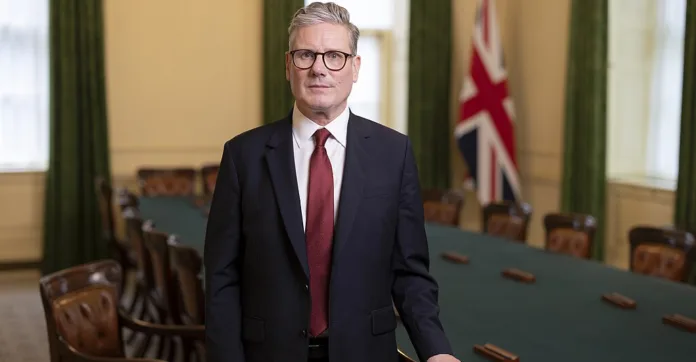Keir Starmer faces criticism over perceived reduction in support for Ukraine’s fight against Russia, sparking concerns about the UK’s stance in the ongoing conflict
Labour leader Sir Keir Starmer has come under fire for allegedly weakening the UK’s support for Ukraine amid its ongoing struggle against Russian aggression. The criticism comes at a time when Ukrainian President Volodymyr Zelensky has been vocal about the need for increased assistance from Western allies.
In recent months, Starmer has faced scrutiny over his party’s position on Ukraine. Critics argue that his statements and policy proposals suggest a potential reduction in support for Ukraine, a stark contrast to the strong backing previously demonstrated by the UK government. This shift in stance has raised concerns among Ukrainian officials and international observers about the future of UK-Ukraine relations and the broader support for Ukraine’s defence efforts.
Embed from Getty ImagesStarmer’s comments and policy adjustments have been interpreted by some as a move to align more closely with public opinion and party factions that are increasingly questioning the extent of the UK’s involvement in the conflict. This perceived weakening of support has come under particular scrutiny given the high-profile visit of President Zelensky to the UK last month, where he emphasized the urgent need for continued and increased military and financial aid from international partners.
During Zelensky’s visit, the UK government, including Starmer, pledged to maintain strong support for Ukraine, but recent developments have led some to question whether these promises are being fulfilled. Critics argue that Starmer’s actions and rhetoric suggest a potential softening of the UK’s position, which could impact the overall effectiveness of the international response to the conflict.
Starmer’s office has defended his stance, asserting that the Labour leader remains committed to supporting Ukraine. However, the backlash has highlighted the delicate balance Starmer must maintain between addressing internal party concerns and maintaining a robust foreign policy stance. The criticism reflects broader debates about the UK’s role in international conflicts and the extent of its commitment to supporting allies in times of crisis.
The Telegraph
Ukraine has urgently appealed to UK Labour leader Sir Keir Starmer to approve the use of British-donated Storm Shadow missiles against Russian targets. The plea emphasizes that these missiles, with a range of 190 miles, could significantly impact the conflict by targeting key Russian infrastructure, including airfields, command posts, and supply lines.
The request reflects Kyiv’s ongoing struggle to gain an upper hand in the war against Russia. Ukrainian officials believe that deploying the Storm Shadows would offer a critical advantage and potentially alter the course of the conflict. The move would mark a significant escalation in the use of Western-supplied weaponry in the war, which has already seen substantial international involvement.
The Storm Shadow missiles, known for their long range and precision, are seen as a vital tool for Ukraine to disrupt Russian operations and supply chains. The British government and its allies are weighing the implications of this request, balancing the potential military benefits against the risks of escalating tensions further.
As the situation evolves, the international community remains closely engaged in discussions about the role of advanced weaponry in the ongoing conflict and its impact on regional stability.
THE TIMES
The recent footage of British Challenger 2 battle tanks being used by Ukrainian forces has intensified discussions about the UK’s role in the conflict. This escalation is part of Ukraine’s new offensive towards Kursk, a move that highlights the significant involvement of British military equipment and advisory support in the conflict.
UK officials, including Sir Keir Starmer and Defence Secretary John Healey, have been preparing for the implications of this development. The British government had been discreetly involved in Ukraine’s military efforts, providing crucial equipment like drones and offering advisory support for two years. The strategic use of these resources has played a pivotal role in Ukraine’s counteroffensive.
Russian reactions to these developments have been fierce, with MP Mikhail Sheremet predicting that Western involvement could exacerbate tensions. Despite these concerns, defence sources suggest that fears of a nuclear escalation are overblown. The focus remains on the strategic impact of British support and how it affects the broader geopolitical landscape.
As the situation evolves, the UK and its allies must navigate the complexities of international involvement in the conflict, balancing military support with the potential for increased global tensions.
